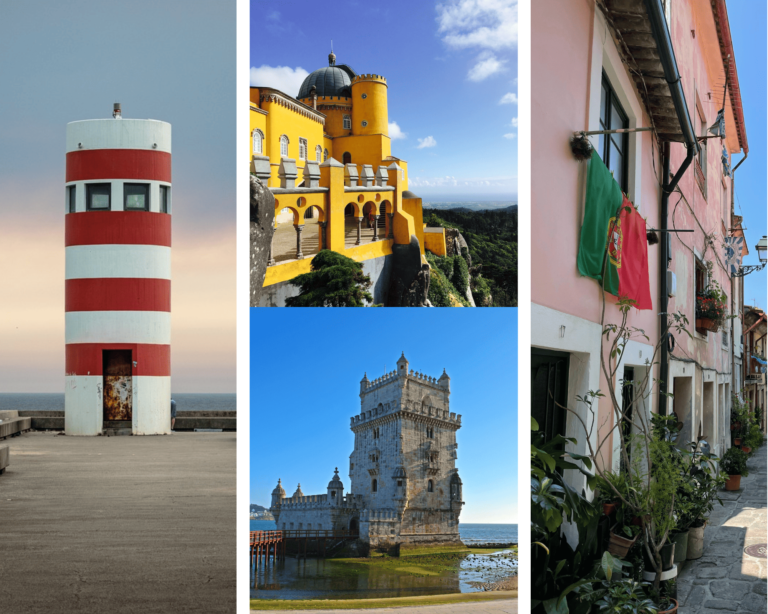Do Digital Nomads Pay Taxes in Portugal? Learn How and When
Learn about the most important aspects about taxes for digital nomads in Portugal: regulations, taxation, rates and benefits.
Portugal has become one of the most sought-after destinations for digital nomads over the past decade, thanks to its stunning landscapes, year-round warm climate, and vibrant, welcoming culture. Today, the country is home to over 16,000 digital nomads, and that number continues to grow.
A common misconception is that digital nomads, without a permanent residence in a country, are exempt from paying taxes. However, this belief can lead to serious legal issues, making it essential to understand the tax obligations that come with living and working abroad.
Tax laws can complicate matters, whether you’re a resident of a country or planning a temporary stay elsewhere. For digital nomads, understanding the tax requirements of their host country is crucial to avoid any unexpected issues.
With this in mind, we’ve created a comprehensive guide that delves into the key aspects of taxes for digital nomads in Portugal. From understanding specific tax laws and determining how much you’ll need to pay, to navigating the compliance process, this resource covers it all. We also explore the fiscal advantages of living in Portugal and highlight potential benefits available to those who decide to settle here.
If you’re wondering how to stay compliant with tax regulations as a digital nomad in Portugal, this article is just what you need. Join us on this informative journey as we debunk common myths and uncover the realities of navigating the tax system in this country.

How do taxes for digital nomads work in Portugal?
Digital nomads living in Portugal are required to comply with the country’s tax laws. Spending more than 183 days in Portugal within a fiscal year classifies an individual as a tax resident. As a result, both income from remote work and earnings within Portugal are taxable. Depending on their circumstances, digital nomads may be liable for various types of taxes.
Taxes for digital nomads in Portugal fall under the country’s Personal Income Tax Code (IRS). It outlines how taxpayers should report income and details the applicable deductions and exemptions.
As of January 2024, Portugal launched a new initiative called the Tax Incentive for Scientific Research and Innovation, replacing the previous non-habitual resident (NHR) status. Now called the New NHR, it offers similar benefits to certain groups, including some digital nomads.
Check out our article on digital nomad taxes, where we take a closer look at the tax landscape and the challenges nomads face when working across different countries.

What type of taxes are relevant for digital nomads in Portugal?
1. Individual Income Tax Code (IRS)
This law outlines the regulations related to income tax for both residents and non-residents. For businesses, corporate taxes are governed by the Corporate Income Tax Code (IRC).
2. Tax Incentive for Scientific Research and Innovation (IFICI)
Following the repeal of the Non-Habitual Resident (NHR) law in 2023, Portugal introduced a new initiative on January 1, 2024, called the Tax Incentive for Scientific Research and Innovation (IFICI). This initiative aims to boost research and innovation by offering a 20% flat tax rate to professors and professionals in science and technology. The program provides these benefits for up to ten consecutive years, fostering growth in key sectors.
Keep in mind that, if you are a digital nomad, you will only be eligible for these tax benefits if you work for a Portuguese company or startup with headquarters in Portugal.
3. Other important taxes are the Value Added Tax (VAT), which is regulated by the VAT Code, and property taxes, which are regulated by the Municipal Property Tax Code (IMI).
When should a digital nomad start paying taxes in Portugal?
Portugal’s tax laws apply to both residents and non-residents under the IRS system. Digital nomads often choose the country’s digital nomad visa to live and work remotely in the country. If you’re interested in learning more about how to apply for this visa, Holafly provides a detailed guide in the following link.
To determine your tax status in Portugal, you must first figure out if you are a tax resident or non-resident. This decision is based on two key factors: the duration of your stay and whether you have a habitual residence in the country. If you spend more than 183 days in Portugal during a fiscal year, you will be classified as a tax resident. If your stay is shorter, you will be a non-resident. Both continuous and non-continuous days are taken into account. Additionally, having a permanent home or place where you stay regularly, even if you’re not there all the time, can make you eligible for tax residency.
Once you establish tax residency, you must pay taxes on all income, whether you earn it in Portugal or overseas. However, if you are a non-resident, you only need to report and pay taxes on income you generate within Portugal.
Tax returns are filed annually. You must file your Income Tax Return (IRS) between April and June of the following year. As a tax resident, you will need to provide details of all your income, both from Portugal and abroad. This includes wages, service fees, and any other forms of income you may have.
If you’re a freelancer or run your own business, it’s crucial to take into account both the IRS and VAT applicable to your personal income. If you sell services to clients in Portugal or the European Union, you may need to register for VAT and charge it to your clients.
Finally, if you do not pay your taxes or do not file on time, you may face penalties as well as interest for late payment of taxes.

Tax benefits for digital nomads in Portugal
Portugal presents attractive tax incentives for digital nomads, with one of the key programs being IFICI. It offers new professional residents in science and technology sectors a fixed tax rate of 20% for a span of 10 years.
An additional benefit to consider is the potential VAT refund, for example, for digital nomads and freelancers who incur expenses related to their work. By registering as a VAT taxpayer and keeping accurate records of your expenses, you can reclaim the VAT paid on products and services necessary for your business. This can help optimize your finances and reduce costs. However, these benefits have specific timeframes. It’s essential to stay informed about current regulations that may impact your tax situation.
How much must a digital nomad pay in taxes in Portugal?
Digital nomads living in Portugal need to account for several types of taxes. Here’s an overview of the key taxes and their applicable rates:
| Personal Income Tax (IRS): | Value Added Tax (VAT): | Social Security Contributions |
| This tax is levied on the income generated by the digital nomad. Rates vary depending on the income bracket and can range from 14.5% to 48%. You must correctly calculate the net income to determine the applicable rate. | If a digital nomad provides services, they may be obliged to charge VAT to their customers. The standard VAT rate in Portugal is 23%, although there are reduced rates for certain goods and services such as food, medication and cultural activities. | Depending on the employment situation, it may be necessary to contribute to social security. This 21.4% rate applies especially if you work for a local company or establish a business in the country. |
Double taxation and tax treaties for digital nomads in Portugal
Double taxation occurs when an individual is taxed on the same income in two different countries. Portugal has tax treaties with 79 countries around the world to avoid this situation, allowing digital nomads not to be taxed on the same income twice.
Important: If you are a frequent traveler and want to stay connected without worrying about expensive roaming or looking for a new SIM at every destination, Holafly’s subscription plans are for you. With a single eSIM, enjoy internet in more than 170 countries for a fixed price and no surprises on your bill. travel without limits and connect easily and securely! 🚀🌍

Where can I get advice before paying taxes as a digital nomad in Portugal?
Having access to specialized tax advice can be incredibly beneficial for digital nomads living in Portugal. Numerous companies and agencies provide online consultancy services, facilitating access to the necessary information.
1. Contabilidade para Nómadas
This agency specializes in providing accounting and tax advisory services tailored specifically for digital nomads. They offer tax management, filing assistance, and personalized online guidance, making it simple to stay on top of your tax obligations. Visit their website for more information.
2. Apex
Apex is a firm specializing in tax advisory and accounting services for freelancers and digital nomads in Portugal. Their team of experts offers online consultations, VAT management, and tailored advice specific to digital nomads.
3. TaxScouts
TaxScouts provides a seamless way for freelancers and digital nomads to connect with tax professionals across Europe. Including experts on Portugal’s tax system for digital nomads. Their online platform simplifies the process of filing taxes and offers tailored advice, allowing easy access to the tax information you need.
4. Deloitte Portugal
Deloitte, one of the world’s leading consulting firms, offers comprehensive tax advisory services in Portugal. Their team of experts provides specialized guidance, including tailored support for digital nomads navigating their tax responsibilities in the country.
5. Freelance platforms
Platforms like Upwork and Fiverr are great places to find tax advisors specializing in services for digital nomads. Look for highly rated freelancers with expertise in the Portuguese tax system who can provide personalized online consultations tailored to your specific needs.
6. Digital nomad communities
Join Facebook groups or forums dedicated to digital nomads in Portugal. Engaging in these communities can lead to valuable advice from experts and agencies offering online services.
How to pay taxes as a digital nomad in Portugal?
To meet your tax obligations in Portugal, here’s a breakdown of the steps digital nomads need to follow:
- Register as a resident. If the 183 day threshold has been exceeded in the country, it is necessary to register as a resident with the Portuguese tax administration (Autoridade Tributária e Aduaneira).
- Obtain a Tax Identification Number (NIF). You must request this number at the tax office, as it is essential for any economic activity.
- Register the economic activity. If you’re working as a freelancer or running a business, you need to register your activity and obtain a license if necessary.
- Issue invoices. In case of rendering services, it is necessary to issue invoices including the corresponding VAT.
- Filing tax returns. It is important to file annual tax returns (declaração de IRS) and quarterly VAT returns, if applicable.
- Pay the taxes due. Once the calculation of income and deductions has been made, the corresponding amount must be paid on the established dates.
- Consult a professional if necessary. Should any doubts arise in the process, do not hesitate to contact a tax advisor for clarification.

Understanding how the IRS works and the key tax laws for digital nomads in Portugal is essential if you’re considering the country as your next destination. With this broader perspective on tax matters, you’ll be able to make more informed decisions and plan ahead.
Frequently asked questions about taxes for digital nomads in Portugal
Digital nomads in Portugal must pay Personal Income Tax (IRS) on income earned both in the country and abroad if tax authorities classify them as tax residents. They may also need to pay Value Added Tax (VAT) if they provide services, along with Social Security contributions.
Portugal considers a digital nomad a tax resident if they spend more than 183 days in the country during a tax year or maintain a permanent residence there. Either way, they must pay taxes on their global income.
In Portugal, IRS rates range from 14.5% to 48%, depending on the taxpayer’s income bracket. It’s crucial to accurately calculate your net income to determine the applicable rate.
The IFICI, introduced in 2024, offers a reduced tax rate of 20% for a period of ten years to qualified professionals in the fields of science and innovation working with Portuguese companies. This tax benefit replaces the former non-habitual resident regime and comes with more specific conditions and restrictions.
Yes, a digital nomad who qualifies as a tax resident in Portugal must pay taxes on all global income, not just income earned within the country.
The government applies VAT to the sale of goods and services. Digital nomads who provide services may need to charge VAT to their clients. Portugal applies a standard rate of 23%, though it offers reduced rates for certain products and services.
Many companies and platforms offer online tax advice for digital nomads, such as Contabilidade para Nómadas, Apex, TaxScouts, and large firms such as Deloitte and PwC. You can also find professionals on freelance platforms such as Upwork and Fiverr. In addition, participating in digital nomad communities on social networks can provide you with valuable recommendations.





 Language
Language 


















 No results found
No results found



